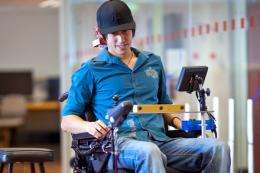Smart wheelchair soars in top innovations list

Aviator, the smart wheelchair technology developed in the UTS Centre for Health Technologies, has been awarded third place in the Anthill SMART 100 Index.
Anthill is an online business channel dedicated to the promotion of Australian innovation and entrepreneurship. It is one of the top 1000 Australian websites and founded the SMART 100 Index to identify and promote new innovations around Australia.
Aviator has been developed at UTS in the form of two wheelchairs, TIM (Thought-controlled Intelligent Machine) and SAM (Semi Autonomous Machine). The system directs and controls the chairs' navigation by reading users' head movements and brainwaves.
Professor Hung Nguyen, Dean of the Faculty of Engineering and Information Technology and the project leader in the development of the smart wheelchair, said that the Aviator project is significant in its potential to impact the broader Australian community.
"I'm interested in research outcomes that can assist people with illnesses and disabilities to achieve greater independence, and the Aviator technology does exactly that," said Professor Nguyen, who also developed Hypomon, a non-invasive diabetes monitoring system which is being commercialized by AiMedics and recently attracted a $1.94 million Commercialisation Australia grant.
"This research is significant because we now have the opportunity to apply the same technological approach to other disability aids. In future we may be able to use it help people with a range of tasks in their everyday lives, and adapt it so that it can be applied to different types of disabilities."
The Anthill SMART 100 applications were reviewed by a panel of 100 expert judges who were looking for innovative ideas that were novel and that had the potential to be commercially successful by meeting the needs of a specific target market.
In the case of Aviator, the commercial viability of the idea is now being tested; the technology is in the process of being made publicly available in partnership with UniQuest, UTS's research commercialisation partner.
UniQuest representative Leigh Angus said that the venture is currently seeking further investment in both research and development and that it provides an excellent opportunity for investors who are both financially and socially motivated.
"We're seeking a special investor who really wishes to see a venture make sound business decisions but also wishes to give back to society in significant ways," Angus said.
Angus believes that Aviator offers a unique opportunity to enhance the lives of people who are permanently and severely paralyzed or disabled.
"Aviator provides a lot of options for people who are unable to use a powered wheelchair because of their physical disabilities. Using this technology they can regain some mobility and independence in their lives."
Provided by University of Technology, Sydney


















